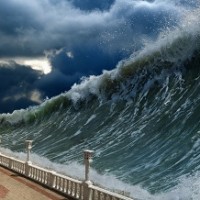Tsunami


Tsunami – No Great Enemy
Thailand and Hawaii, two different nations, with different culture and orientation, nothing seems to be in common for these two countries but what makes them the same is the fact that these countries were struck by a colossal natural menace, tsunami. It’s hard to suffice what comes to someone’s mind when they hear the word “tsunami”. Treacherous, fatal, a turncoat – for the past decades, this natural catastrophe had shattered many lives, properties and even dreams. Though, it doesn’t occur that often, the aftermath is devastating. No shelter, dead loved ones, no food, no water, people are put in the midst of nothing. The trauma, the fear and the trepidation that it had to its victims is immeasurable. With its frightening number of victims and the lives that it had taken people are getting more cautious and are more eager to learn about this deceitful enemy.
Here are some of the facts that everyone should know about tsunami:
- Tsunami is a Japanese term which means “harbor wave”. It is represented by two characters such “tsu” which means harbor while “nami” meaning wave.
- A tsunami is a sequence of huge waves usually can reach for as high as 100 feet caused by earthquake, landslide and volcanic eruption.
- For those who are living within the vicinity of the Pacific Oceans Ring of Fire, there is an 80% tendency of a tsunami occurrence.
- The first wave of a tsunami isn’t always the strongest, successive waves tend to get bigger and stronger as it struck the coast.
- Tidal waves can travel for as fast as a jet plane at about 500 miles or 805 kilometers an hour.
- Hawaii, Alaska, Washington, Oregon and California are the states in the U.S. with huge tendencies of experiencing a tsunami.
- If someone had been caught by a tsunami, it’s advisable to grab a floating device or an object and allow the current to carry him. Swimming is not recommended by experts.
- The occurrence of tsunami is calculated based on the depth of the water, distances from one place to another and the time that an earthquake occurred or other factors the can trigger a tsunami to happen.
- In 2004, an earthquake caused a tsunami in the Indian Ocean and its impact is paralled to the energy of 23,000 atomic bombs leaving a staggering number of 283,000 dead people.
With those facts having been stated it is best for everyone to know some safety precautions in case of tsunami occurrence.
- If you’re living in the coastal areas, stay alert and be aware of tsunami warnings.
- Have a planned evacuation route that leads to higher grounds.
- Know the signs of tsunami like rapid rising and falling of coastal waters.
- Since tsunami is a series of waves, people are restricted to return to an affected coastal area until authorities say it is safe.
No one and nothing can really predict when such calamity may occur, it could happen in a blink of an eye. You had your eyes closed for one second and the moment you open them nothing’s left. Yet, above all those safety precautions that had been stated someone’s faith to the Almighty is the best shield in order to battle this gigantic enemy. Tsunami maybe huge but nothing is bigger than the God. And in every challenge and obstacle that one confirms it is necessary to stand firm and strong amidst life’s encumbrances.


